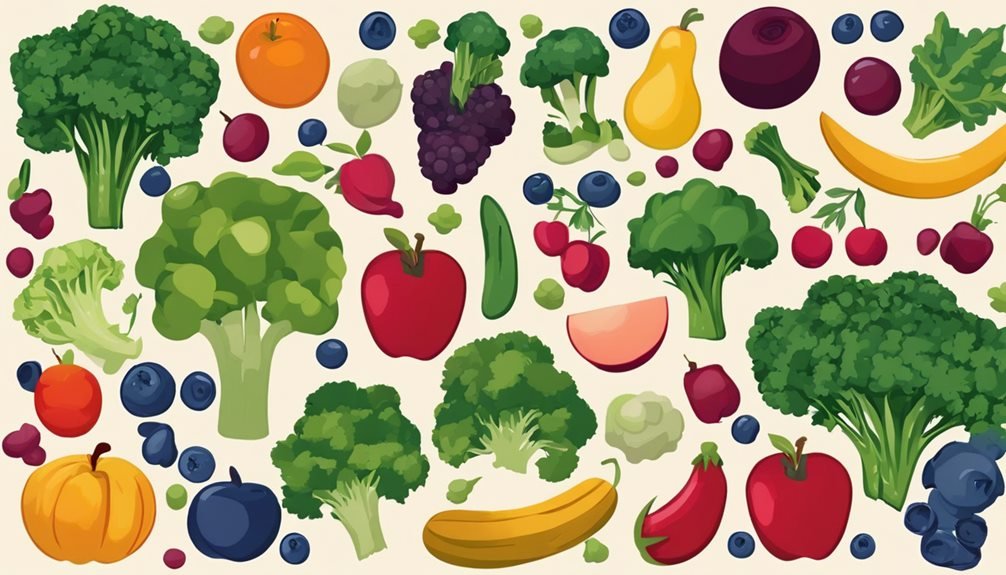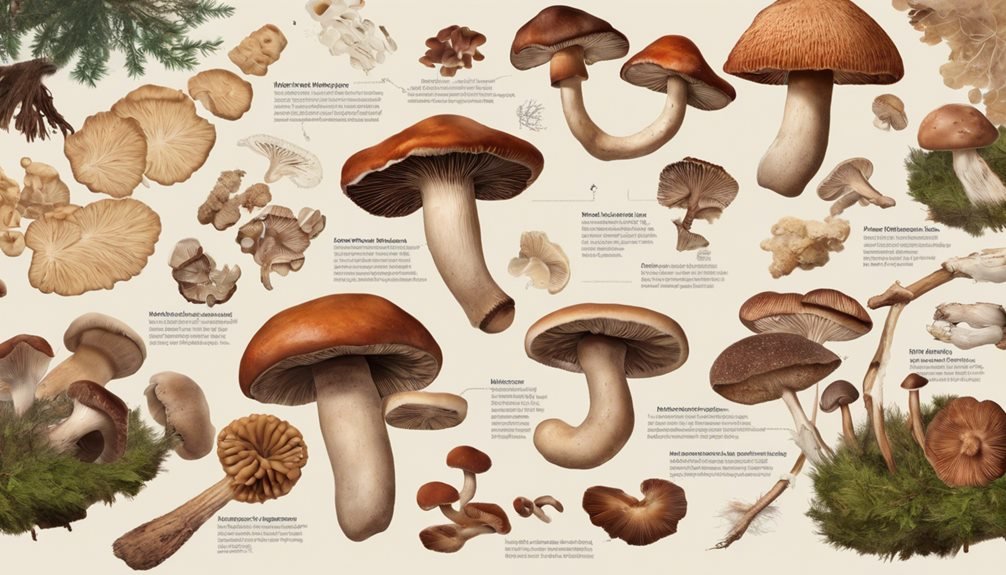Flavonoids, found abundantly in various plant-based foods, offer a compelling defense against cancer. These remarkable compounds possess potent properties that can significantly impact cancer prevention and management. By exploring the intricate ways in which flavonoids interact with cancer cells, you will uncover a fascinating realm of natural defense mechanisms that could revolutionize how we approach cancer treatment.
Key Takeaways
- Flavonoids exhibit antioxidant properties that combat cancer-causing free radicals.
- They possess anti-inflammatory characteristics, reducing cancer-promoting inflammation.
- Flavonoids support cell protection and apoptosis mechanisms, crucial in cancer prevention.
- These phytonutrients inhibit angiogenesis and metastasis, hindering cancer progression.
- Clinical studies show flavonoids enhance cancer treatment effectiveness and improve patient outcomes.
What Are Flavonoids?
Flavonoids are a diverse group of phytonutrients found in plants that play a crucial role in human health. These compounds are known for their antioxidant properties, which help protect the body from damage caused by free radicals. One of the significant health benefits of flavonoids is their potential to reduce the risk of various diseases, including cancer.
Dietary sources rich in flavonoids include fruits such as berries, apples, citrus fruits, and grapes. Vegetables like onions, kale, broccoli, and spinach are also excellent sources. Additionally, beverages like tea, especially green tea, and red wine contain significant amounts of flavonoids. Consuming a diet rich in these plant-based foods can help ensure an adequate intake of flavonoids, contributing to overall health and well-being.
Incorporating a variety of flavonoid-rich foods into your diet can provide numerous health benefits, including reducing inflammation, improving heart health, and potentially lowering the risk of cancer.
Types of Flavonoids
Within the realm of phytonutrients, the classification of flavonoids is based on their chemical structure and biological activity. Flavonoids are categorized into various subgroups, including flavones, flavonols, flavanones, flavan-3-ols, anthocyanidins, and isoflavones. Each subgroup has distinct structural characteristics that determine their specific functions and health benefits.
Flavonoids are commonly found in a wide range of plant-based foods, such as fruits, vegetables, tea, and red wine. Some of the richest sources of flavonoids include citrus fruits like oranges and lemons, berries such as strawberries and blueberries, onions, parsley, and green tea. These natural sources provide a diverse array of flavonoids that contribute to the protective effects against various diseases, including cancer.
Understanding the different types of flavonoids and their dietary sources is essential for harnessing their potential health benefits. By incorporating a variety of flavonoid-rich foods into your diet, you can maximize the protective effects of these phytonutrients and support your overall well-being.
Flavonoids and Antioxidant Activity

Having discussed the various types of flavonoids and their dietary sources, it is important to explore the role of flavonoids in antioxidant activity. Flavonoids are potent antioxidants that play a crucial role in protecting cells from oxidative damage. They help neutralize free radicals in the body, which are unstable molecules that can cause harm to cells and contribute to various diseases, including cancer. Research has shown that flavonoids can also benefit cardiovascular health by reducing inflammation and improving blood flow. Additionally, these compounds have been linked to anti-aging effects on the skin, helping to combat skin aging by reducing oxidative stress and promoting collagen production.
| Benefits of Flavonoids | Cardiovascular Health | Skin Aging |
|---|---|---|
| Antioxidant Properties | Supports heart health | Anti-aging effects |
| Anti-inflammatory Effects | Improves blood flow | Reduces oxidative stress |
| Collagen Production | Reduces inflammation | Promotes skin elasticity |
Anti-inflammatory Properties of Flavonoids
With their potent antioxidant properties well-established, it's important to delve into the anti-inflammatory properties of flavonoids. Flavonoids have shown promising results in modulating the immune response and combating chronic inflammation, both of which play crucial roles in the development and progression of various diseases, including cancer.
Studies have indicated that flavonoids can regulate immune responses by modulating the production of pro-inflammatory mediators, such as cytokines and chemokines. By doing so, flavonoids help to maintain a balanced immune system, preventing excessive inflammation that can lead to tissue damage and disease.
Furthermore, flavonoids have been found to inhibit key inflammatory pathways in the body, such as the NF-kB pathway, which is involved in the regulation of genes that control immune responses and inflammation.
Flavonoids and Cell Protection

For safeguarding cells against damage and promoting overall health, flavonoids play a crucial role in providing protection at a cellular level. These powerful plant compounds are known for their ability to support cellular repair and shield DNA from harm, aiding in the maintenance of optimal cellular function.
| Cellular Repair | DNA Protection |
|---|---|
| Supports the repair processes within cells, helping them recover from damage more efficiently. | Acts as a shield against harmful mutations and oxidative stress that can damage the DNA within cells. |
| Helps maintain the integrity and functionality of cells, contributing to overall health and well-being. | Plays a vital role in preserving the genetic information housed within cells, ensuring proper cell function and replication. |
| By enhancing cellular repair mechanisms, flavonoids assist in combating various stressors that can compromise cell health. | Safeguards the genetic material of cells, reducing the risk of mutations that may lead to health issues, including cancer. |
Incorporating flavonoid-rich foods into your diet can provide your cells with the protection they need to function optimally and defend against potential damage.
Flavonoids in Cancer Prevention
To effectively understand the role of flavonoids in cancer prevention, it's essential to delve into the intricate mechanisms by which these plant compounds exert their protective effects at a cellular level. Flavonoids play a crucial role in cancer prevention through various mechanisms, including:
- Enhancing the immune response: Flavonoids have been shown to modulate immune system function, promoting a robust immune response against cancer cells.
- Supporting chemotherapy effectiveness: Studies suggest that flavonoids can enhance the efficacy of chemotherapy drugs, potentially improving treatment outcomes for cancer patients.
- Reducing oxidative stress: Flavonoids possess potent antioxidant properties, helping to combat oxidative stress and reduce cellular damage that can lead to cancer development.
Understanding how flavonoids interact with the immune system and chemotherapy drugs is vital in harnessing their full potential for cancer prevention. By incorporating these natural compounds into your diet, you may be able to support your body's defenses against cancer and improve treatment outcomes.
Flavonoids and Tumor Growth Inhibition

Flavonoids also demonstrate significant potential in inhibiting tumor growth, a critical aspect of cancer prevention and treatment. Studies have shown that flavonoids possess properties that can impede tumor progression, making them promising candidates for cancer therapy. These natural compounds act on multiple pathways involved in tumor development, including cell proliferation, angiogenesis, and metastasis.
One way flavonoids inhibit tumor growth is by modulating signaling pathways that regulate cell division and survival. By interfering with these pathways, flavonoids can effectively suppress the uncontrolled growth of cancer cells. Additionally, flavonoids exhibit anti-inflammatory and antioxidant effects, which further contribute to their ability to inhibit tumor progression.
Moreover, flavonoids have been found to induce apoptosis, a process of programmed cell death essential for preventing the proliferation of abnormal cells. This mechanism plays a crucial role in eliminating cancerous cells and halting tumor growth.
Flavonoids in Apoptosis Induction
With their ability to induce apoptosis, flavonoids emerge as key players in the realm of cancer prevention and treatment. Apoptosis, or programmed cell death, is a crucial mechanism in the body that eliminates damaged or unwanted cells. Flavonoids have shown remarkable potential in promoting apoptosis in cancer cells, thereby inhibiting tumor growth and progression.
Here are three ways in which flavonoids contribute to apoptosis mechanisms and cancer cell death:
- Activation of Caspases: Flavonoids have been found to activate caspases, which are key enzymes involved in the initiation and execution of apoptosis in cancer cells.
- Regulation of Bcl-2 Family Proteins: Flavonoids can modulate the expression of Bcl-2 family proteins, which play a critical role in regulating the intrinsic pathway of apoptosis.
- Disruption of Mitochondrial Function: Some flavonoids can disrupt mitochondrial function in cancer cells, leading to the release of pro-apoptotic factors and ultimately triggering cell death.
Flavonoids and Angiogenesis Suppression

In the realm of cancer research, a significant area of focus lies in understanding how flavonoids play a role in suppressing angiogenesis, a process crucial for tumor growth and metastasis. Angiogenesis regulation refers to the formation of new blood vessels from pre-existing ones, a key factor in tumor progression. Flavonoids have demonstrated the ability to inhibit this process through various mechanisms.
Studies have shown that flavonoids can downregulate the expression of pro-angiogenic factors, such as vascular endothelial growth factor (VEGF), which are essential for the growth of blood vessels to supply nutrients to tumors. By interfering with these signaling pathways, flavonoids hinder the formation of new blood vessels, ultimately limiting the blood supply to tumors and impeding their growth.
Furthermore, flavonoids have been found to suppress the activity of matrix metalloproteinases (MMPs), enzymes involved in breaking down the extracellular matrix to promote angiogenesis. By inhibiting MMPs, flavonoids help maintain the integrity of the extracellular matrix, preventing the formation of new blood vessels and inhibiting tumor progression.
Flavonoids and Metastasis Prevention
Research in the field of cancer biology has highlighted the potential of certain compounds in mitigating metastasis, a critical aspect of cancer progression. Flavonoids, naturally occurring compounds found in various fruits, vegetables, and beverages like tea and red wine, have shown promise in preventing metastasis through their influence on immune response and cell migration.
- Flavonoids and Immune Response:
- Flavonoids have been found to modulate the immune system, enhancing its ability to identify and target cancer cells that may be circulating in the body.
- Flavonoids and Cell Migration:
- Studies suggest that flavonoids can inhibit the movement of cancer cells, reducing their ability to spread to distant organs and form secondary tumors.
- Overall Impact:
- By targeting both immune response and cell migration, flavonoids may play a crucial role in preventing the spread of cancer within the body, potentially improving patient outcomes.
Understanding the mechanisms through which flavonoids exert their effects on metastasis opens up new possibilities for developing targeted therapies to combat cancer progression.
Clinical Studies on Flavonoids

Clinical studies on flavonoids have provided valuable insights into their potential as adjunct therapies in cancer treatment. Research has shown that flavonoids can enhance the effectiveness of chemotherapy by increasing the sensitivity of cancer cells to anti-cancer drugs. Flavonoids exhibit synergistic effects when combined with radiation therapy, leading to improved outcomes in cancer patients.
In a study published in the Journal of Cancer Research and Therapeutics, it was found that the administration of flavonoids alongside chemotherapy resulted in a significant reduction in tumor size compared to chemotherapy alone. This highlights the potential of flavonoids to enhance the therapeutic effects of traditional cancer treatments.
Furthermore, a systematic review published in the International Journal of Molecular Sciences demonstrated the synergistic effects of flavonoids with radiation therapy, showing increased cancer cell death when both treatments were combined.
These findings underscore the promising role of flavonoids as complementary therapies in cancer treatment, offering new avenues for improving patient outcomes and quality of life.
Incorporating Flavonoids in Diet
The incorporation of flavonoids into your diet plays a crucial role in harnessing their potential health benefits, particularly in relation to cancer prevention and treatment. To make the most of flavonoids in your daily meals, consider the following:
- Cooking with flavonoids: Opt for cooking methods that preserve the flavonoid content in fruits and vegetables, such as steaming or stir-frying instead of boiling.
- Daily flavonoid intake: Aim to include a variety of flavonoid-rich foods in your daily diet, such as berries, citrus fruits, dark chocolate, and green tea.
- Pairing flavonoid-rich foods: Enhance the absorption of flavonoids by combining them with sources of vitamin C, like bell peppers, broccoli, or strawberries, as vitamin C helps increase the bioavailability of flavonoids in the body.
Frequently Asked Questions
Can Flavonoids Be Harmful if Consumed in Large Quantities?
Consuming excessive amounts of flavonoids can lead to Flavonoid toxicity or Flavonoid overdose. It's crucial to be mindful of your intake, as overconsumption may have adverse effects on your health.
To prevent any potential harm, it's recommended to follow the recommended daily intake guidelines and consult with a healthcare professional if you have concerns about flavonoid consumption in large quantities.
Do All Fruits and Vegetables Contain Flavonoids?
Yes, not all fruits and vegetables contain flavonoids. Flavonoid sources vary widely, with some common ones being berries, citrus fruits, onions, and parsley.
The absorption of flavonoids in the body depends on factors like food preparation and individual metabolism. Understanding the diversity of flavonoid sources and their absorption mechanisms can help you make informed dietary choices to maximize their potential health benefits.
Are Flavonoids Safe for Pregnant Women to Consume?
Flavonoids are generally safe for pregnant women to consume in moderate amounts. They can offer potential benefits, such as antioxidant properties. However, overconsumption of flavonoids during pregnancy may have adverse effects.
It's essential to maintain a balanced diet and consult with a healthcare provider to ensure you aren't exceeding safe limits. Keep in mind that individual tolerance levels may vary, so always prioritize your health and well-being during pregnancy.
Can Flavonoids Interact With Medications or Supplements?
When considering potential interactions with medications or supplements, it's essential to be cautious. Always consult with a healthcare provider before introducing flavonoids into your regimen, especially if you're taking medications. Understanding how flavonoids may influence the effectiveness or side effects of your medications is crucial for your overall health.
Prioritize supplement safety and take necessary precautions to ensure your well-being while incorporating flavonoids into your routine.
How Can I Ensure I Am Getting Enough Flavonoids in My Diet?
To ensure you're getting enough flavonoids in your diet, focus on incorporating flavonoid-rich foods like berries, citrus fruits, dark chocolate, and green tea. These natural sources offer a variety of health benefits beyond just flavonoids.
If needed, consider flavonoid supplements, but always consult with a healthcare provider first to ensure they won't interact with any medications or supplements you're already taking.
A balanced diet is key to maximizing your flavonoid intake.
Conclusion
In conclusion, the profound impact of flavonoids on cancer prevention and management cannot be overstated. Their antioxidant and anti-inflammatory properties, along with their ability to protect cells, inhibit angiogenesis, and prevent metastasis, make them an essential component in the fight against cancer. Incorporating flavonoid-rich foods into your diet is a simple yet powerful way to enhance the effectiveness of cancer treatments and improve patient outcomes. Embrace the power of flavonoids for a healthier future.





